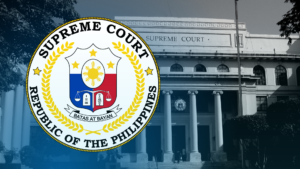By DIEGO MORRA
Sifting through the arguments raised by the National Union of People’s Lawyers (NUPL) and even former Supreme Court (SC) justices against the unanimous decision of the High Court to declare the articles of impeachment against Vice President Sara Zimmerman Duterte Carpio “unconstitutional,” the question now is: Can the 13 justices who signed the decision be impeached themselves for “trifling with the law” or imposing new requirements for the filing of impeachment complaints when the old rules sufficed?
Taking the position of the Kilusang Magbubukid ng Pilipinas (KMP) on matter seriously, is it proper and compelling for investigating the magistrates on the basis of a claim that the “the ruling is a blatant move to shield Duterte from accountability and halt the impeachment process — not only now, but effectively until February 2026.” KMP stressed that the SC’s rewriting of the impeachment rules is impunity disguised in legal jargon and argued that the “SC cited a violation of the constitutional ‘one-year ban’ and alleged due process issues, stating that multiple impeachment complaints were filed within one year and that Duterte was not given the opportunity to respond to the allegations. According to the Court, this invalidated the articles of impeachment and stripped the Senate of jurisdiction to proceed with a trial.”
Is it now possible for the 13 justices who concurred with the ponencia of Senior Associate Justice Marvic Leonen be impeached themselves for promulgating a decision that has surfeit of law but suffers from the paucity of justice? Or for cutting corners and giving short shrift to the internal rules of the legislature? This is a unique case of the High Tribunal being subjected to an investigation on the basis of an assailed decision. Ignorance of the law excuses no one. Not even the 13 wise magistrates of the SC, In the US, one such assailed decision was the Dredd Scott ruling written by Chief Justice Roger Taney, who declared that slaves cannot own property because they are slaves. Not even the abolition of slavery could make slaves equal to Whites. Taney ruled that both Blacks and Whites were “equal, but separate.” It took some years before the Taney decision was thrown to jurisprudential purgatory.
KMP argued that this decision is part of a broader, calculated effort by the ruling elite to protect one of their own. “From Malacañang to the Senate, and now the SC — all institutions have worked in unison to block the impeachment. It’s a clear indication of the rot within the system, which they are desperate to preserve,” the group argued. “More than the technicalities, the core issue is Sara Duterte’s misuse of P612.5 million in confidential funds and the chronic failure to hold her accountable. The Supreme Court’s decision creates new legal hurdles that make an already difficult accountability process nearly impossible. It favors bureaucrat capitalism and protects those in power from public scrutiny,” KMP explained.
NUPL also agreed that the SC “departed from the Constitution” by applying an interpretation of initiation not grounded in its plain text. “Archiving or congressional adjournment do not cure this constitutional deficiency,” the NUPL said, noting that complaints that were never referred to the committee were never formally initiated. “To treat unacted, unreferred complaints as having been ‘initiated and dismissed’ is to grant legal effect to what the Constitution does not recognize,” it added. Under
Article XI, Section 3(4) of the Constitution, an impeachment complaint signed by at least one-third of House members automatically becomes the articles of impeachment and must proceed to trial, without the need to notify or hear from the respondent at that stage. These provisions cannot be supplanted by a unanimous SC verdict or reinterpreted by the wise magistrates without violating the Constitution itself. Perhaps, it is now time to subject the SC and its corps of “confidential lawyers” to rigorous inquiry inasmuch as a flawed decision cannot be part of the law of the land.
“The Vice President’s opportunity to respond is preserved before the Senate, acting as an impeachment court, as it always has been in our constitutional practice,” the NUPL said. Imposing new procedures like furnishing the respondent with the complaint and seeking his or her response, NUPL warned the SC risks obstructing the House’s exclusive power to initiate impeachment. “The delicate balance of powers must be carefully maintained. Any departure from this equilibrium, however well-intentioned, risks disrupting the constitutional order,” NUPL explained. By requiring those who filed the complaint to provide the respondent with the evidence in order to abide by the due-process principle transforms impeachment into a criminal case, which it is not. NUPL said the decision was a “misreading of the impeachment timeline and a misapplication of the Constitution.”
Looking into allegations that the SC decision was rushed, did not accord due process to the complaining lawmakers and neglected to call for oral arguments, the ground has been laid for an inquiry into the actions of the honorable magistrates. A 97-page decision could not have been discussed, written and finalized in a matter of five days or one week unless a task force of trusted lawyers worked on it double time, dividing the work to complete it for promulgation before the State of Nation Address (SONA) is delivered. Moreover, While the court found the complaint unconstitutional for violating the one-year ban and lacking due process, former Chief Justice Artemio Panganiban and retired Associate Justice Adolf Azcuna also warned that the July 25, 2025 ruling imposed new interpretations that risk undermining the fairness and balance envisioned by the Constitution.
Azcuna explained the decision introduced a new definition of what it means to “initiate” an impeachment complaint. Citing a 2003 Francisco v. House of Representatives ruling, he said that a complaint is only considered initiated when it is referred to the House committee on justice. “The new definition, however, would now cover a situation where the complaints were NOT referred to a committee and, after the lapse of the time to do so, archived, and thus, the SC said, ‘effectively dismissed,’” Azcuna added. The retired magistrate said the Lower House relied on the old definition and acted properly when it adopted the fourth complaint and transmitted the articles of impeachment to the Senate. It would not be fair to retroactively apply the court’s new interpretation, Azcuna said.




